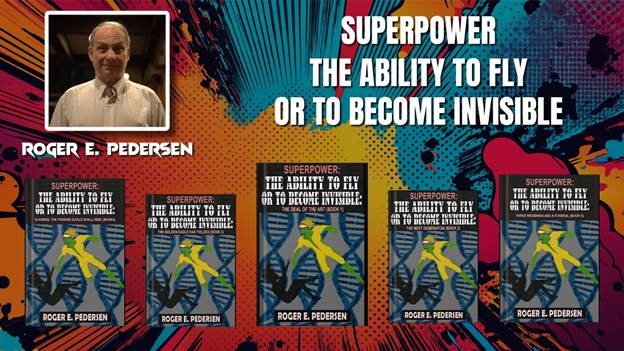Roger E. Pedersen: The Journey of a Visionary Author and Game Designer

Roger E. Pedersen’s journey to becoming an author is one of passion, creativity, and the relentless pursuit of storytelling. From a young age, he was drawn to books and video games, which fueled his imagination and love for creating new worlds. He was fascinated by how stories could take people to different realities, allowing them to experience emotions, conflicts, and adventures beyond everyday life.
As he grew older, his interest in storytelling expanded into the world of video game design. The ability to create interactive experiences where players could engage with narratives uniquely intrigued him. Over time, he became famous in the gaming industry, developing games that blended compelling characters, immersive settings, and strategic gameplay. However, while video games offered a way to tell stories interactively, he felt the medium had limitations. There were deeper themes and philosophical questions he wanted to explore, and he realized that writing books would give him the freedom to do so.
Transitioning from game design to writing was not an easy decision, but it allowed him to embrace his vision as a storyteller fully. The ability to craft intricate plots, develop characters with depth, and explore intense ideas without constraints was a challenge he was eager to take on. This shift led to the creation of his latest book, SuperPower: The Ability to Fly or to Become Invisible: The Golden Eagle Has Yielded, a novel that reflects his unique approach to storytelling, combining elements of adventure, science fiction, and moral dilemmas.
In his latest book, he explores the concept of power and the choices that come with it. The story presents a deep question: If you had the power to either fly or become invisible, which would you choose? More than just a hypothetical scenario, this question is the foundation for a narrative that delves into human nature, morality, and the impact of possessing extraordinary abilities. The book follows individuals who develop superhuman powers through secretive government projects and genetic experimentation. However, rather than focusing on traditional heroism, the story challenges readers to consider the ethical consequences of such abilities.
Throughout the novel, he examines how different characters respond to power. Some embrace their abilities for personal gain, while others struggle with the responsibility that comes with them. The book does not present clear heroes and villains but instead portrays characters in shades of moral ambiguity. This complexity allows readers to see their reflections in the story, as it raises questions about ambition, justice, and the cost of power.
The theme of identity is another central aspect of the book. As the characters face their newfound abilities, they must confront who they are and what they stand for. This struggle mirrors real-life experiences where people define themselves amidst societal expectations and personal desires. The book also highlights the influence of institutions, particularly how governments and organizations attempt to control those who possess extraordinary abilities. This dynamic presents a broader commentary on authority, surveillance, and the ethics of scientific advancement.
Readers who pick up SuperPower will be immersed in a story that challenges them to think beyond the surface. The book is not just about action and adventure but about introspection and moral choices. The dilemmas faced by the characters resonate with actual struggles, making the book deeply relatable. In their own lives, many people encounter moments where they must decide how to use the influence and opportunities available to them. Whether in their careers, relationships, or personal aspirations, the concept of power and responsibility is something everyone can connect with.
Beyond its philosophical undertones, the book is also relevant today, where technological advancements continue to blur the lines between science fiction and reality. With discussions about artificial intelligence, genetic engineering, and government surveillance becoming more prevalent, Pedersen’s novel serves as both an entertaining and thought-provoking reflection on the future of human potential.
As an author, Pedersen is not stopping with this book. He is already working on the next installment in the book series, promising even more intrigue and deeper explorations of human nature. In addition to his writing, he is also considering expanding his work into other media formats. Whether through film adaptations, television series, or interactive digital experiences, he constantly seeks new ways to bring his stories to life.
His engagement with readers extends beyond his books. Through interviews, podcasts, and discussions on storytelling, he continues to share his insights on the creative process and the themes that drive his work. His ability to merge his background in video game design with his passion for writing gives him a unique perspective that sets him apart as a storyteller.
Roger E. Pedersen’s journey from game designer to author proves his commitment to storytelling in its purest form. His latest books have narratives that go beyond entertainment to explore the complexities of power, identity, and moral responsibility. Through his work, he challenges readers to reflect on their values and decisions, making his stories exciting and meaningful.
With more projects on the horizon, he continues to push the boundaries of storytelling, ensuring that his work remains impactful and thought-provoking. His writing invites readers to question their perspectives, encouraging them to think about what they would do if given extraordinary power. As he continues to evolve as a writer, his ability to create compelling and introspective narratives solidifies his place as a significant voice in both the literary and gaming worlds.